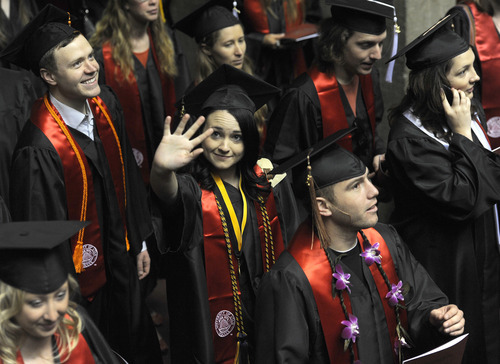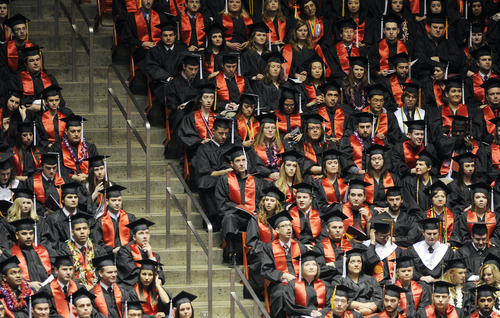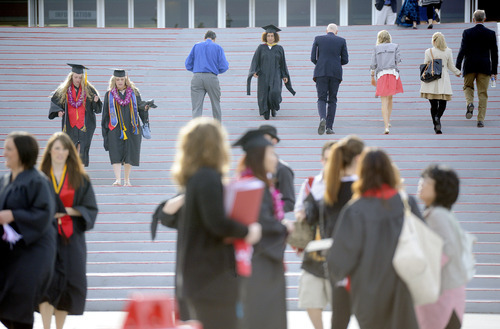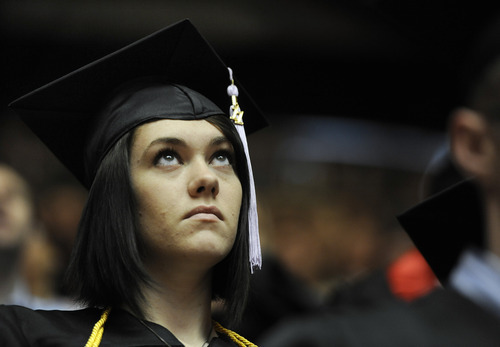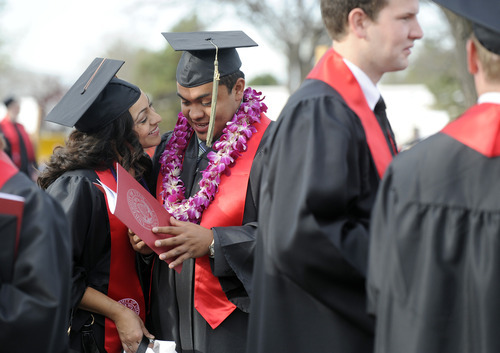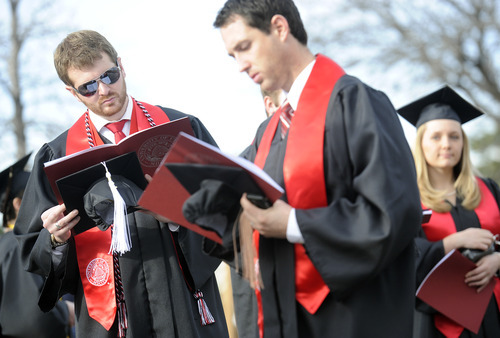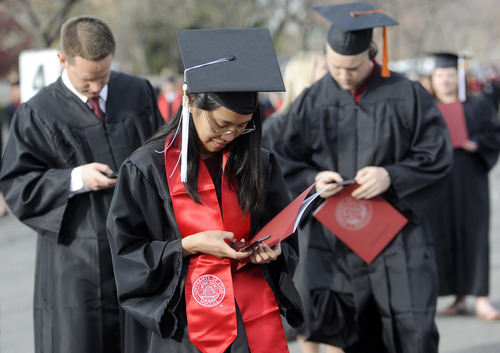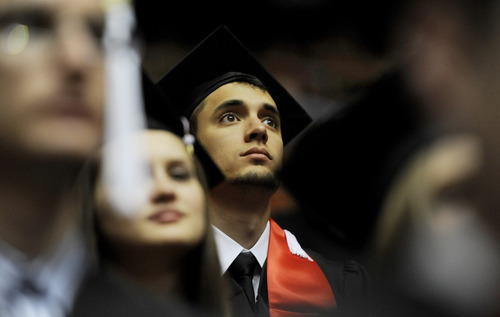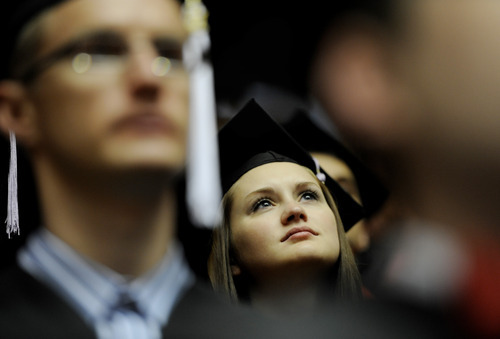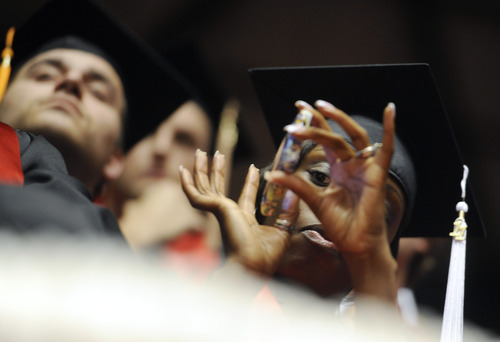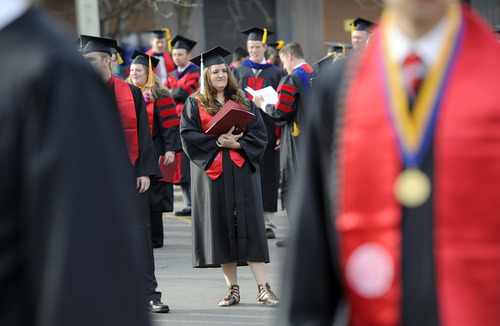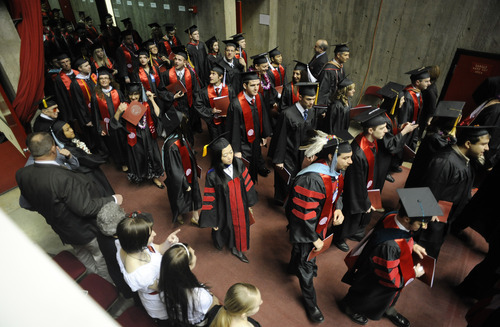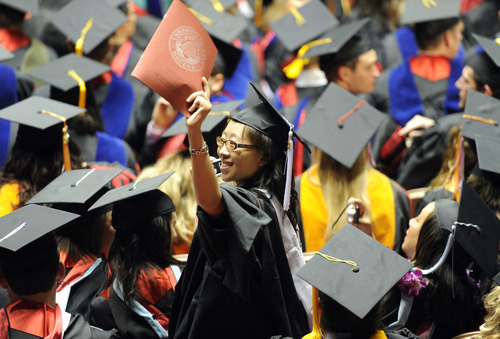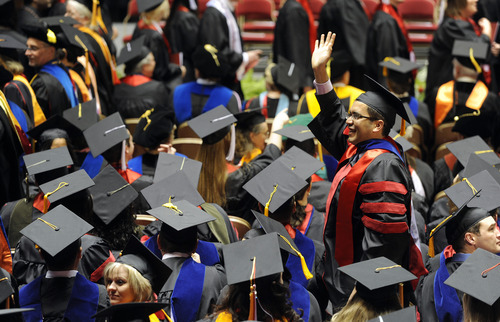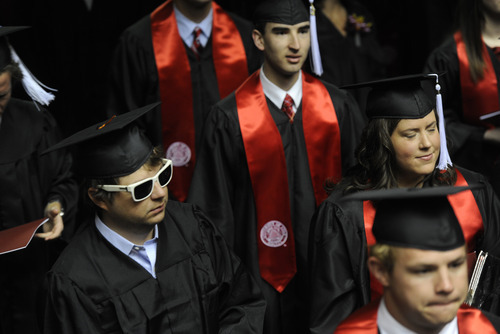This is an archived article that was published on sltrib.com in 2011, and information in the article may be outdated. It is provided only for personal research purposes and may not be reprinted.
Something strange will happen to University of Utah graduates after Friday's commencement, predicted its keynote speaker Mitch Albom: A middle-aged person will approach them and whisper in their ears the most important words they will ever hear.
"This person is you 20, 30 years from now coming back to this moment to warn you how your life is going to turn out," the sports writer and author of Tuesdays with Morrie said at the Huntsman Center, where the university celebrated more than 7,400 students earning degrees.
Among them was speaker Lara Ramos Galas. The English major told fellow graduates that one of her key experiences as a student occurred not in a classroom, but on a campus shuttle bus. One day during her freshman year, she found herself riding with several Latino construction workers. One was curious about her studies and she told him about her classes and interest in literature.
"He paused to tell me that he was proud of me and that he hoped I would continue with my education because there are too few Mexican students on this campus," Galas said. "After that shuttle ride, my attitude toward school changed. I was naïve of the influence I could have on my community and my family."
Galas spent part of her junior year in London and expects to pursue a graduate degree in English literature. The daughter of a Mexican immigrant grew up in Ogden and attended Christian Heritage High School.
"Although my father was never able to access formal education, he continues to remind me about the power and responsibility that comes with an education. I have the power to access knowledge, to raise my voice, and to question the world around me," Galas said. "I also have the responsibility to not waste my education."
Galas is among 314 Hispanic U. students receiving degrees this year. Although Hispanics comprise 4.2 percent of the entire graduating class, graduates from underrepresented groups made huge gains this year, with Hispanics comprising the largest share, according to the U.'s Office for Equity and Diversity. Nearly 1,000 of the 2011 graduates are students of color.
This year's class will be the last to hear from Michael Young as U. president. After seven years, he departs for Seattle this summer to lead the University of Washington.
"I stand in awe as this university has moved from success to success. The university is on a remarkable trajectory on all fronts," Young said. "It's been the greatest honor and privilege to participate in the success of this university."
Under Young's tenure the university has raised admissions standards, internationalized the campus, increased fundraising and research funding, initiated more than $1 billion in construction projects, and gained admission to the NCAA's premierPac-12 Conference.
"You have been an extraordinarily effective leader and you're leaving a tremendous legacy," said U. trustees Chairman Randy Dryer, thanking Young for his service. "We wish you well, but we will show no mercy to your Huskies when they visit us next year on the gridiron."
To highlight what he calls the "transformative power" of education, Young could hardly have landed a better keynoter than Albom, whose runaway bestseller describes his visits to a professor who had a transformative impact on his life. In his address, Albom recounted the lessons he learned from the eternally youthful Morrie Schwartz, a retired Brandeis University sociologist who was brimming with joy despite his advanced years and the ravages of Lou Gerhig's disease.
Albom met Schwartz on his first day in college and wound up taking every course he offered.
"I majored in sociology not because I was interested in it, but because it would be a shame to waste all those credits," Albom said. At graduation he gave Schwartz a monogrammed briefcase and a promise to stay in touch, which he failed to honor for 16 years as he became busy pursuing his career as a widely read sports columnist.
"My future self came back and told me this was a terrible mistake," he said. "We forget the people who make us the people who can have that kind of success."
Albom counseled the graduates to make sure their future self will return to say "you have helped others, you have been true to yourself."
"Don't let people tell you to get real, if real is a code word for getting cynical or too busy," Albom said. "Giving is living: Remember that lesson." He is known as "Mr. Thermochemistry."
Peter Armentrout, a long-time University of Utah chemistry professor and two-time department chairman, studies the mechanisms by which atoms bond and has become a world leader in physical chemistry.
On Friday another honor was added to a decorated career: The Rosenblatt Prize for Excellence, the U.'s highest faculty honor.
Armentrout exemplifies "the perfect combination of academic excellence, life-changing research, and creative leadership" the prize recognizes, said U. President Michael Young in awarding it at commencement.
The professor has helped the U. secure major research grants and funding for its nuclear magnetic resonance facility and a major addition to the Eyring building. He has published so prolifically, with nearly 400 scientific publications to his credit, that he is responsible for much of what is known today about thermochemistry, the study of energy associated with chemical reactions, according to colleagues.
"The scope, dominance, creativity and excellence of Armentrout's research program in gas-phase ion thermochemistry touches on many areas of chemistry, such that he is among the most highly cited chemists," said U. chemist Peter Stang in a release.
Armentrout earned a bachelor's degree at Case Western Reserve University and went to Caltech for his doctorate, before joining Berkeley's chemistry faculty in 1981. At Berkeley, he initiated a program to probe a wide range of chemistries using ion-beam mass spectrometry, a method for determining a substance's chemical makeup by separating ions according to their mass-to-charge ratios. He moved to the U. in 1987 and was named a Cannon Fellow in 2003.
Among his many awards are a Camille and Henry Dreyfus grant, a Presidential Young Investigator Award in its inception year from the National Science Foundation, an ISI Highly Cited Researcher in Chemistry award, and a Biemann Medal from the American Society of Mass Spectrometry.
The Rosenblatt prize comes with a $40,000 gift, drawn from an endowment established in 1983 by the Joseph and Evelyn Rosenblatt family to honor the civic leadership and generosity of Joseph's parents, Nathan and Tillie Rosenblatt, who immigrated to Utah from Russia a century earlier. Recent winners include historian Robert Goldberg, director of the Tanner Humanities Center, physicist Valy Vardeny, and computer scientist Chris Johnson. Visit the gallery on our Facebook page and tag yourself!


